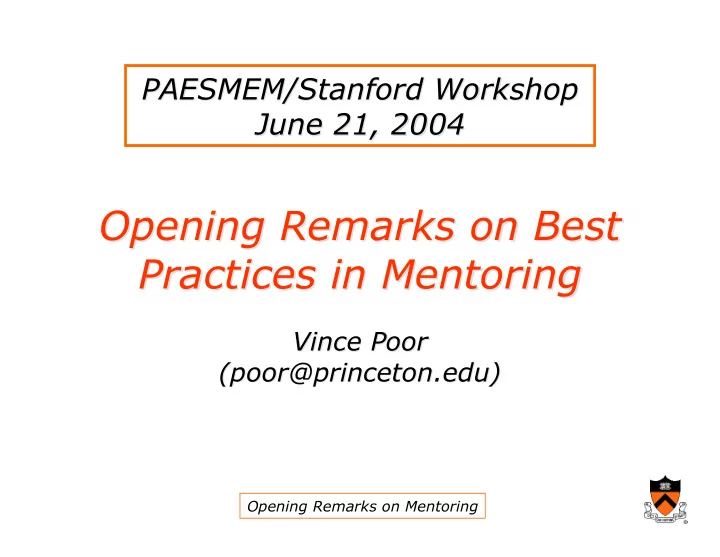

PAESMEM/Stanford Workshop PAESMEM/Stanford Workshop June 21, 2004 June 21, 2004 Opening Remarks on Best Opening Remarks on Best Practices in Mentoring Practices in Mentoring Vince Poor Vince Poor (poor@princeton princeton. .edu edu) ) (poor@ Opening Remarks on Mentoring
Outline Outline • General Observations • Stages of Mentoring – Graduate Students – Untenured Faculty – Senior Faculty • Issues in the Mentoring of Women Opening Remarks on Mentoring
General Observations General Observations • Mentoring is more art than science. – Corollary: There may be as many “best practices” as there are mentor-advisee pairs. – As with other arts, we can still look for general principles of good mentoring. (Which is why we’re here!) – But, also as with other arts, there will be reasonable disagreement as to what constitutes “good mentoring”. • The personality, aspirations and career stage of the mentor are major factors. Opening Remarks on Mentoring
Stages of Mentoring: Stages of Mentoring: Graduate Students Graduate Students • Grad school is an apprenticeship for learning to do research. • The student’s main objective is to learn to produce creative, front-edge research, and to publish it to the community. • Students need: – freedom to explore and create (a lot of it) – encouragement – patience – confidence-building (progressive steps in presenting work) Opening Remarks on Mentoring
Stages of Mentoring: Stages of Mentoring: Untenured Faculty Untenured Faculty • An assistant professorship is an apprenticeship for learning to be a professor. • Junior faculty are in much greater need of mentoring than graduate students: – they have a much more complex job than graduate students – they need to achieve a balance with “real life” – there is no written “curriculum” for success – they have no official advisor – their environment may not be supportive or even benign Opening Remarks on Mentoring
Stages of Mentoring: Stages of Mentoring: Untenured Faculty (Cont’ ’d) d) Untenured Faculty (Cont • Untenured faculty need to focus their energies on: – building a visible, independent research program; and – being a good classroom teacher. • Ways to help (aside from emphasizing the above): – sharing successful proposals and proposal-writing advice – sharing class notes – introductions to colleagues and at funding agencies – invitations to workshops, special sessions, etc. Opening Remarks on Mentoring
Stages of Mentoring: Stages of Mentoring: Senior Faculty Senior Faculty • Senior faculty primarily need help with career advancement and recognition. • A mentor can help via: – nominations for positions of responsibility – nominations for awards – encouragement & reassurance • This is a two-way street; i.e., at some point the distinction between mentor and advisee blurs. Opening Remarks on Mentoring
Issues in Mentoring of Women Issues in Mentoring of Women • Grad students: A good practice is to treat all students the same, recognizing differences only in personality or ability. • Untenured faculty: Two key issues: – Tokenism: a pitfall is to become immersed in committee work – Children & the tenure clock: a (the?) major concern; answers?? • Senior faculty: – Imposter syndrome: seems to be voiced more often by women Opening Remarks on Mentoring
Mentor as Hero! Mentor as Hero! "When these hard deeds were done by Lord Odysseus the immortal gods were not far off. I saw with my own eyes someone divine who fought beside him, in the shape and dress of Mentor …” [ The Odyssey (Book 24)] Opening Remarks on Mentoring
Recommend
More recommend